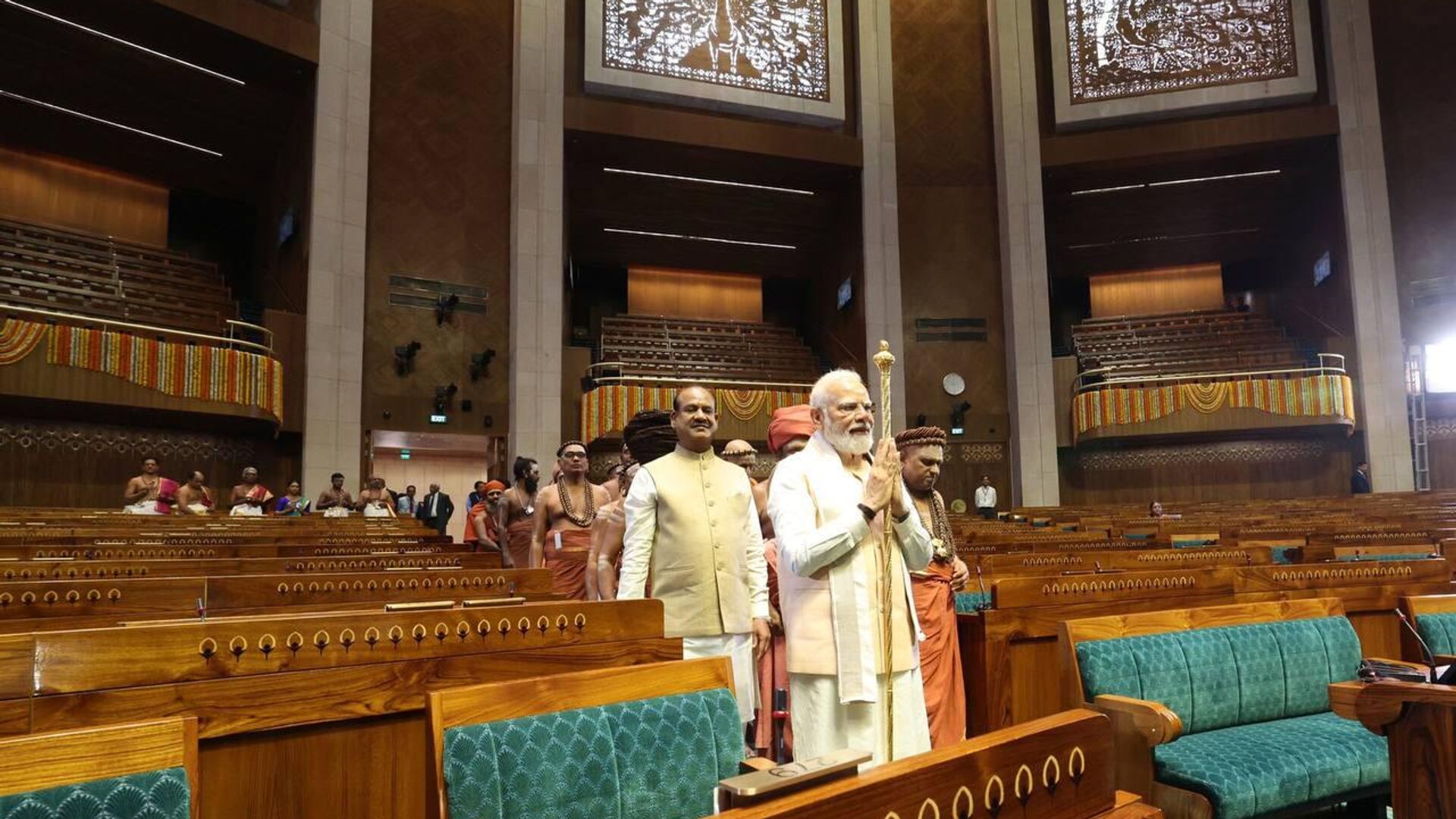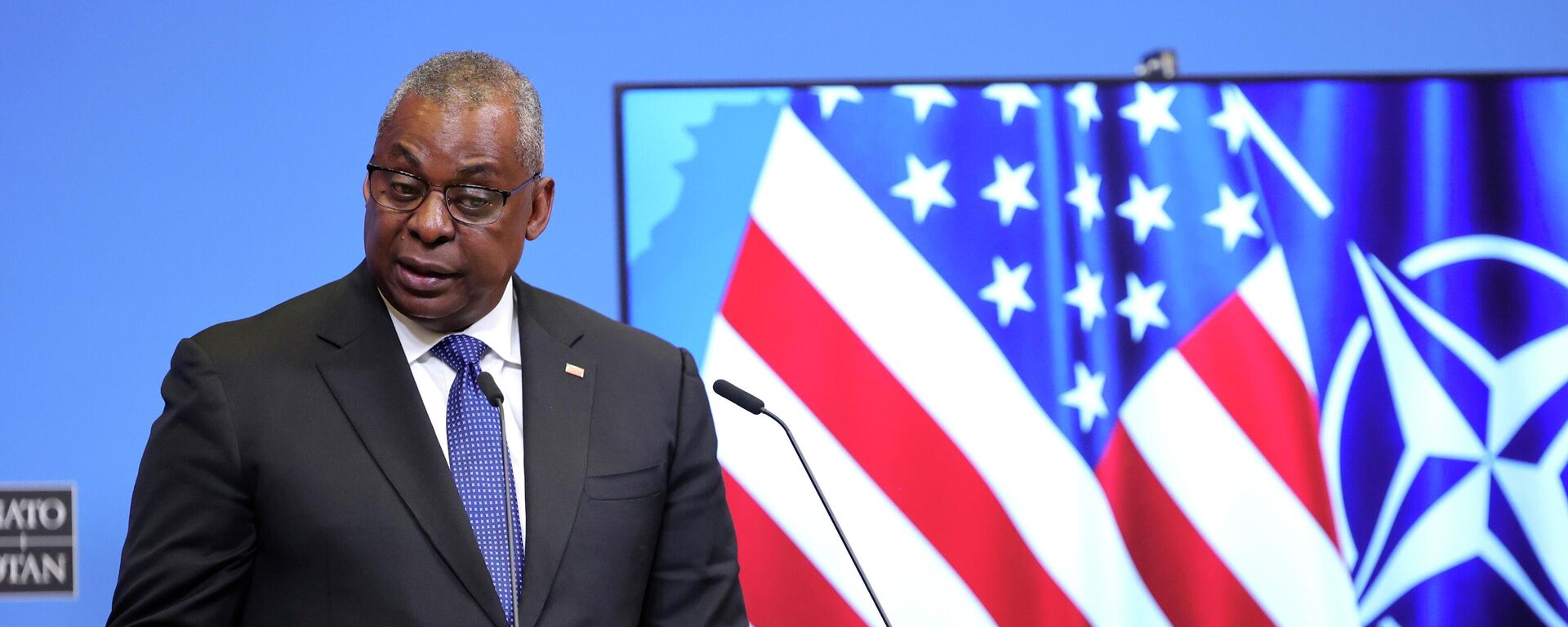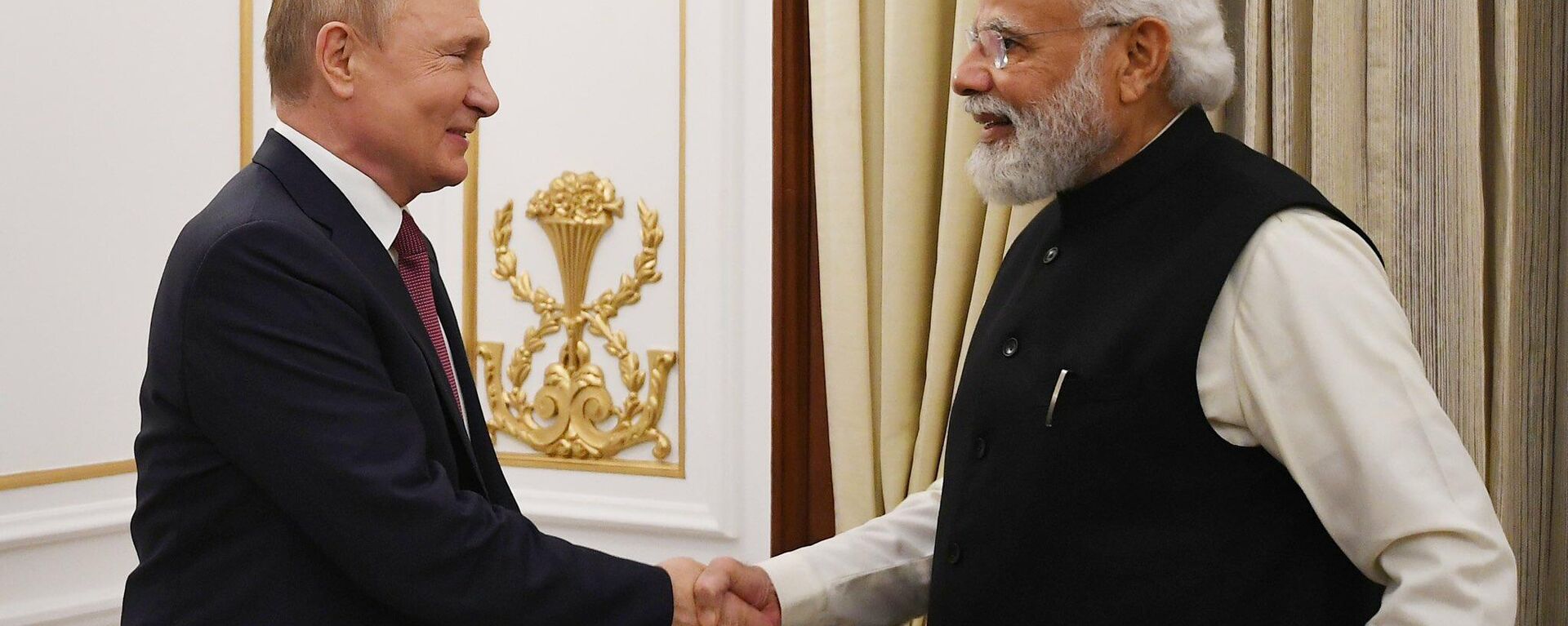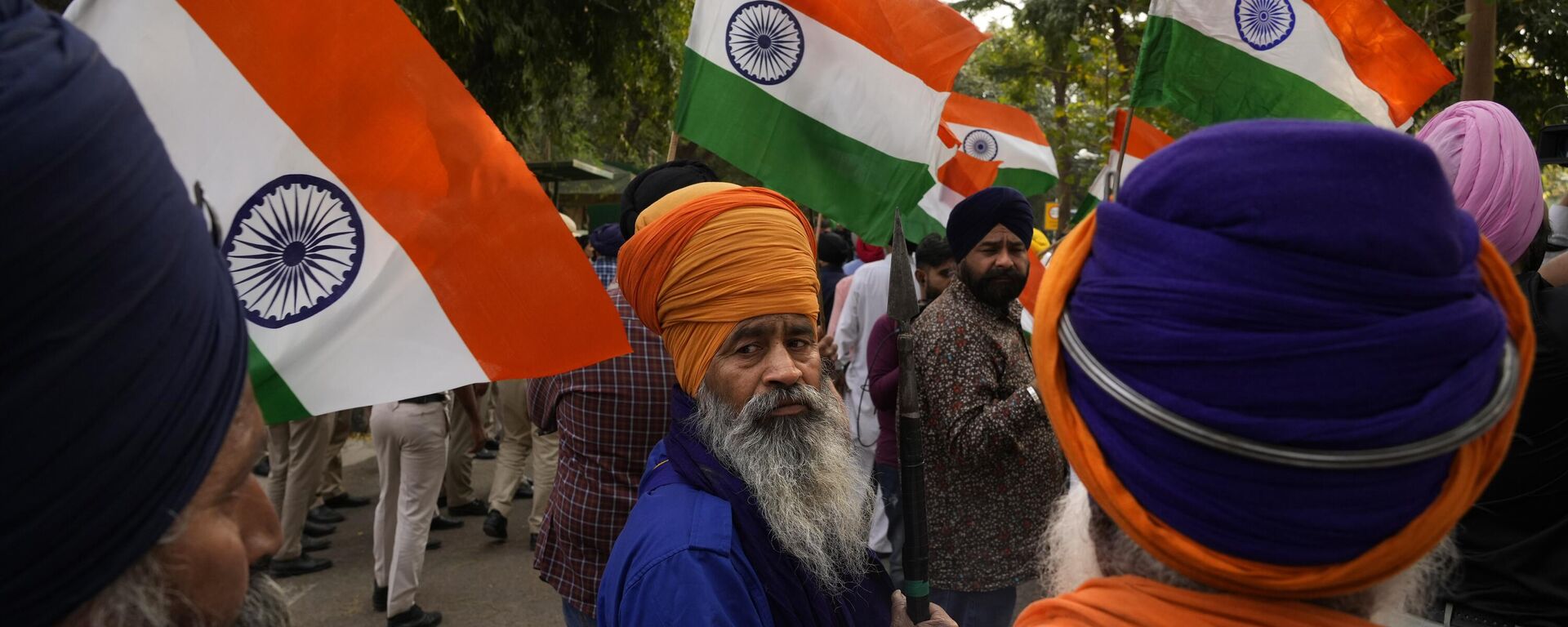https://sputniknews.in/20230611/pundits-hail-indias-balanced-foreign-policy-assertiveness-at-border-and-support-for-diaspora-2413496.html
Pundits Hail India's Balanced Foreign Policy, Assertiveness at Border and Support for Diaspora
Pundits Hail India's Balanced Foreign Policy, Assertiveness at Border and Support for Diaspora
Sputnik India
Ahead of the litmus test of Narendra Modi Government in the next year's Parliamentary Polls, a range of Indian experts talked about how the last decade has been for India and Indians.
2023-06-11T08:30+0530
2023-06-11T08:30+0530
2023-06-11T11:10+0530
sputnik opinion
india
indian diaspora
us
polar satellite launch vehicle (pslv)
economic crisis
covid-19 vaccine
global south
russia
new delhi
https://cdn1.img.sputniknews.in/img/07e7/05/1c/2206021_0:75:1281:795_1920x0_80_0_0_0704c49ff6804192f5714b338e377aee.jpg
As a spirited opposition is working to cobble up a sturdy coalition to counter the ruling BJP in the 2024 national polls, Sputnik touches upon some vital issues to understand how the government reflected its gumption and approach since 2014.We asked Indian experts how the Modi government evolved as a strong power in spheres including economy, defense, and diplomacy, especially while thwarting Western pressure to invigorate its relations with old or new allies.According to Strategic and Security Analyst, Major General (Dr) Shashi Asthana, the Indian image and capacity building have improved considerably in the last decade.About Pakistan, Asthana told Sputnik that since it continues to follow the path of supporting terrorism, “there has not been much progress as far as bilateral relations are concerned."However, he said, the silver lining is “we had a ceasefire and it's holding out for quite some time.”After certain Indian acts like the 2019 Balakot strike, there have been no major terror strikes and terrorism is reducing, he argued.“I think the impact of the Indian rise has been felt in Pakistan," he commented.The security expert likewise commented that although the disengagement has been carried out, de-escalation has not taken place. “We are still looking for de-escalation. But India has made its point very clearly and concisely that relations cannot be normal under the situation unless the situation at the border is not.”Although China has been trying to sideline the border issue and improve relations, India has held to its gun, he asserted.A Bipolar World is Not in India's InterestProf. Ajay Patnaik, ex-head of Centre for Russian and Central Asian Studies and former dean of the School of International Studies, JNU, highlighted the Modi government's sagacity in keeping the US in good stead while safeguarding the sanctity of its old relations with Russia.He shared that even during and post the Soviet period, India has managed a sort of "balancing act". Now, the nation wants Russia to be a strong pillar of the multi-polar world rather than being weakened.Prof. Patnaik said that this is important because if Russia is defeated, a bipolar world might emerge between the US and China. “That is not in India's interest,” he opined, explaining that Russia and India are the countries which “will be the balancing factor.”So the balancing act is in a different league now. With this, truly multi-polar world, the world doesn't have to become bipolar after this conflict. So, it is not in India's interest that Russia becomes weaker. It wants Russia to play a very strong role in the global affairs.Dr. Sheetal Sharma, an expert on culture and society in Europe and diaspora studies, affirmed that the Indian diaspora trusts the Modi government to fall back upon in a crisis.Dr. Sharma opined that when the government whole-heartedly helps you while you are in danger or during times of crisis or sending diplomatic help or even for that matter in visa issues and all those things, this is very important that they feel that they are cared for. There is somebody -- a system that backs them up. “If you look at how the US protects its nationals all over the world, even one life matters to them. A similar kind of template is getting set for Indians also. That the Indian government is going to take care of every possible challenge that Indians are facing no matter in what part of the world,” the JNU professor added.She said that confidence gets into and it gives them greater strength and stability to face the host countries in terms of its challenges. “Because they know that there is a safety net to fall back upon.”Furthermore, the Indian government is proactively getting involved in the issues and raising them with the respective governments at a bilateral level which is giving them a sense of confidence, the professor concluded.Asked if the Indian economic rise is good for the Global South, Ashwani Mahajan, national co-convenor of the Indian economic advocacy group Swadeshi Jagran Manch, said that India has emerged as the fifth-largest economy in terms of the exchange rate, GDP and purchasing power parity. As per the purchasing power, it's GDP is the third-largest in the world.Explaining his reasons, Mahajan said: "It’s because of the kind of attitude of the West which we have witnessed all these years during COVID especially, they were not willing to give up their patents, even on a TRIPS waiver, and not even willing to give raw material or the vaccine even when it was in surplus with them and was going waste.”He said in the past also, when space was the monopoly of the US and developing countries had to pay through their nose to the US for their space programs, India could provide them with a cheaper alternative, helping to set up their communication and telecom systems with the help of India's space program."Our PSLV transported their satellites into space... So whenever India goes stronger, it is for the benefit of India… while strengthening our relationship with the West or other developed countries, we are also equally interested to boost our relations with our friends in developing countries," Mahajan concluded.
https://sputniknews.in/20230531/us-wants-to-co-opt-india-in-military-confrontation-with-china-ex-envoy-2263501.html
https://sputniknews.in/20230605/india-refuses-to-succumb-to-us-pressure-to-break-ties-with-russia-ambassador-denis-alipov-2336297.html
https://sputniknews.in/20230327/indian-diaspora-in-west-asset-for-new-delhi-or-an-anti-india-weapon-1315684.html
india
us
global south
russia
new delhi
moscow
china
pakistan
beijing
islamabad
ladakh
Sputnik India
feedback.hindi@sputniknews.com
+74956456601
MIA „Rossiya Segodnya“
2023
Sandeep Datta
https://cdn1.img.sputniknews.in/img/07e7/04/07/1468069_0:258:1800:2058_100x100_80_0_0_3909870b82375b0693e9fd27915facc3.jpg
Sandeep Datta
https://cdn1.img.sputniknews.in/img/07e7/04/07/1468069_0:258:1800:2058_100x100_80_0_0_3909870b82375b0693e9fd27915facc3.jpg
News
en_IN
Sputnik India
feedback.hindi@sputniknews.com
+74956456601
MIA „Rossiya Segodnya“
Sputnik India
feedback.hindi@sputniknews.com
+74956456601
MIA „Rossiya Segodnya“
Sandeep Datta
https://cdn1.img.sputniknews.in/img/07e7/04/07/1468069_0:258:1800:2058_100x100_80_0_0_3909870b82375b0693e9fd27915facc3.jpg
9 years of modi govt , 9 years of modi, 9 years of modi sarkar, indian diaspora under modi, indian diaspora, indian diaspora under modi govt, indian diaspora under modi government, india china border, india china border dispute, india china border stand off, india china border face off, india china ladakh disengagement, india china disengagement, india china deescalation, balakot strike, balakot air strike, balakot air strikes, india russia strategic partnership, india russia relations, new delhi moscow ties, india russia alliance, india russia oil import, india russia oil imports, swadeshi jagran manch, global south, india space policy 2023, india space policy, india space program, india rocket launch, pslv launch, isro, gaganyan launch, gaganyaan mission, indian economy, india gdp growth, india growth rate, indian growth projection
9 years of modi govt , 9 years of modi, 9 years of modi sarkar, indian diaspora under modi, indian diaspora, indian diaspora under modi govt, indian diaspora under modi government, india china border, india china border dispute, india china border stand off, india china border face off, india china ladakh disengagement, india china disengagement, india china deescalation, balakot strike, balakot air strike, balakot air strikes, india russia strategic partnership, india russia relations, new delhi moscow ties, india russia alliance, india russia oil import, india russia oil imports, swadeshi jagran manch, global south, india space policy 2023, india space policy, india space program, india rocket launch, pslv launch, isro, gaganyan launch, gaganyaan mission, indian economy, india gdp growth, india growth rate, indian growth projection
Pundits Hail India's Balanced Foreign Policy, Assertiveness at Border and Support for Diaspora
08:30 11.06.2023 (Updated: 11:10 11.06.2023) Ahead of the litmus test of Narendra Modi's government in next year's parliamentary polls, a range of Indian experts talked about how the last decade has been for India and Indians.
As a spirited opposition is working to
cobble up a sturdy coalition to counter the ruling BJP in the
2024 national polls, Sputnik touches upon some vital issues to understand how the government reflected its gumption and approach since 2014.
We asked Indian experts how the Modi government evolved as a strong power in spheres including economy, defense, and diplomacy, especially while thwarting Western pressure to invigorate its relations with old or new allies.
According to Strategic and Security Analyst, Major General (Dr) Shashi Asthana, the Indian image and capacity building have improved considerably in the last decade.
The military veteran said: “India has emerged as a great power with strategic autonomy. It has increased its capacity in all domains of comprehensive national power."
About Pakistan, Asthana told Sputnik that since it continues to follow the path of supporting terrorism, “there has not been much progress as far as bilateral relations are concerned."
However, he said, the silver lining is “we had a ceasefire and it's holding out for quite some time.”
After certain Indian acts like the 2019 Balakot strike, there have been no major terror strikes and terrorism is reducing, he argued.
“I think the impact of the Indian rise has been felt in Pakistan," he commented.
With China, there is currently a "standoff on the border in Ladakh…although China got the first-mover advantage, India also reacted very fast… and did a mirror deployment. We also took a quid pro quo action. And thereafter, I think, the Chinese also had to withdraw."
The security expert likewise commented that although the disengagement has been carried out, de-escalation has not taken place. “We are still looking for de-escalation. But India has made its point very clearly and concisely that relations cannot be normal under the situation unless the situation at the border is not.”
Although China has been trying to sideline the border issue and improve relations, India has held to its gun, he asserted.
A Bipolar World is Not in India's Interest
Prof. Ajay Patnaik, ex-head of Centre for Russian and Central Asian Studies and former dean of the School of International Studies, JNU, highlighted the Modi government's sagacity in keeping the US in good stead while safeguarding the sanctity of its old relations with Russia.
He shared that even during and post the Soviet period, India has managed a sort of "balancing act". Now, the nation wants Russia to be a
strong pillar of the multi-polar world rather than being weakened.
Prof. Patnaik said that this is important because if Russia is defeated, a bipolar world might emerge between the US and China.
“That is not in India's interest,” he opined, explaining that Russia and India are the countries which “will be the balancing factor.”
"We can create the different poles strong enough, not two powers dictate terms in their various spheres of influence. India's worry would be how to balance the growth of the already strong America and the growing power of China. By these, by standing with countries like Russia."
So the balancing act is in a different league now. With this, truly multi-polar world, the world doesn't have to become bipolar after this conflict. So, it is not in India's interest that Russia becomes weaker. It wants Russia to play a very strong role in the global affairs.
Dr. Sheetal Sharma, an expert on culture and society in Europe and diaspora studies, affirmed that the
Indian diaspora trusts the Modi government to fall back upon in a crisis.
Dr. Sharma opined that when the government whole-heartedly helps you while you are in danger or during times of crisis or sending diplomatic help or even for that matter in visa issues and all those things, this is very important that they feel that they are cared for. There is somebody -- a system that backs them up.
“If you look at how the US protects its nationals all over the world, even one life matters to them. A similar kind of template is getting set for Indians also. That the Indian government is going to take care of every possible challenge that Indians are facing no matter in what part of the world,” the JNU professor added.
She said that confidence gets into and it gives them greater strength and stability to face the host countries in terms of its challenges. “Because they know that there is a safety net to fall back upon.”
Furthermore, the Indian government is proactively getting involved in the issues and raising them with the respective governments at a bilateral level which is giving them a sense of confidence, the professor concluded.
Asked if the Indian economic rise is good for the Global South,
Ashwani Mahajan, national co-convenor of the Indian economic advocacy group
Swadeshi Jagran Manch, said that India has emerged as the fifth-largest economy in terms of the exchange rate, GDP and purchasing power parity. As per the purchasing power, it's GDP is the third-largest in the world.
It’s good news for the Global South. “If India could use vaccines during COVID, and could vaccinate all its population. It was also good news for the other developing countries and the poor countries too,” he remarked.
Explaining his reasons, Mahajan said: "It’s because of the kind of attitude of the West which we have witnessed all these years during COVID especially, they were not willing to give up their patents, even on a TRIPS waiver, and not even willing to give raw material or the vaccine even when it was in surplus with them and was going waste.”
"But still, they were not willing to give the same to the South, to the developing countries," he added. "So, if India prospered whether it was economically or technologically… as a superpower, as a digital power... it turns good news for the Global South," he pointed out.
He said in the past also, when space was the monopoly of the US and developing countries had to pay through their nose to the US for their
space programs, India could provide them with a cheaper alternative, helping to set up their communication and telecom systems with the help of
India's space program."Our PSLV transported their satellites into space... So whenever India goes stronger, it is for the benefit of India… while strengthening our relationship with the West or other developed countries, we are also equally interested to boost our relations with our friends in developing countries," Mahajan concluded.





